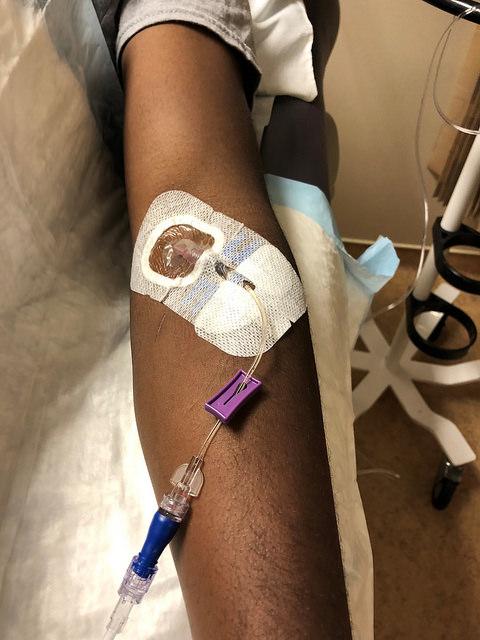Early-stage trial results show promise

Credit: NIAID
The investigational Ebola treatment mAb114 is safe, well-tolerated, and easy to administer, according to findings from an early-stage clinical trial published in The Lancet. Eighteen healthy adults received the monoclonal antibody as part of a Phase 1 clinical trial that began in May 2018 at the National Institutes of Health (NIH) Clinical Center in Bethesda, Maryland. The National Institute of Allergy and Infectious Diseases (NIAID) Vaccine Research Center (VRC), part of NIH, developed the investigational treatment and conducted and sponsored the clinical trial.
The investigational treatment is currently being offered to Ebola patients in the Democratic Republic of the Congo (DRC) under compassionate use and as part of a Phase 2/3 clinical trial of multiple investigational treatments. mAb114, a single monoclonal antibody, binds to the core receptor binding domain of the Zaire ebolavirus surface protein, preventing the virus from infecting human cells. Scientists isolated the antibody from a human survivor of the 1995 Ebola outbreak in Kikwit, DRC. Prior studies showed that mAb114 can protect monkeys from lethal Ebola virus disease when given as late as five days after infection.
Participants in the Phase 1 clinical trial received a single intravenous infusion of mAb114, administered over approximately 30 minutes. Three participants received a 5 milligram(mg)/kilogram (kg) dose; five participants received a 25 mg/kg dose; and 10 participants received a 50 mg/kg dose. All infusions were well-tolerated. Four participants reported mild side effects, such as discomfort, muscle or joint pain, headache, nausea, and chills in the three days following the infusion.
As expected, levels of mAb114 in the blood increased as the dosage was increased. Investigators also observed relatively uniform levels of absorption, distribution, and elimination of mAb114 among participants.
The authors note several advantages for deploying mAb114 in an outbreak setting, including the ease and speed of its administration, and its formulation as a freeze-dried powder that does not require freezer storage. The powder is reconstituted with sterile water and added to saline for administration.
In addition to the ongoing Phase 2/3 clinical trial of mAb114 in the DRC, the VRC is planning to initiate another Phase 1 trial of the investigational treatment in Africa.
###
VRC scientists developed mAb114 in collaboration with scientists at the National Institute of Biomedical Research (INRB) in the DRC; the Institute for Research in Biomedicine and Vir Biotechnology, Inc.’s subsidiary Humabs BioMed, both based in Bellinzona, Switzerland; and the U.S. Army Medical Research Institute of Infectious Diseases at Fort Detrick, Maryland. The Defense Advanced Research Projects Agency funded the production of mAb114 for clinical testing. The investigational treatment is licensed to Ridgeback Biotherapeutics LP based in Coconut Grove, Florida. For more information about clinical trials of mAb114, visit ClinicalTrials.gov and search identifiers NCT03478891 and NCT03719586.
ARTICLE:
MR Gaudinski et al. Safety, tolerability, pharmacokinetics, and immunogenicity of the therapeutic monoclonal antibody mAb114 targeting Ebola virus glycoprotein (VRC 608): an open-label phase 1 study. The Lancet DOI: 10.1016/S0140-6736(19)30036-4 (2019).
WHO:
NIAID Director Anthony S. Fauci, M.D., is available for comment.
CONTACT:
To schedule interviews, please contact Jennifer Routh, (301) 402-1663, [email protected].
NIAID conducts and supports research–at NIH, throughout the United States, and worldwide–to study the causes of infectious and immune-mediated diseases, and to develop better means of preventing, diagnosing and treating these illnesses. News releases, fact sheets and other NIAID-related materials are available on the NIAID website.
About the National Institutes of Health (NIH): NIH, the nation’s medical research agency, includes 27 Institutes and Centers and is a component of the U.S. Department of Health and Human Services. NIH is the primary federal agency conducting and supporting basic, clinical, and translational medical research, and is investigating the causes, treatments, and cures for both common and rare diseases. For more information about NIH and its programs, visit http://www.
NIH…Turning Discovery Into Health®
Media Contact
Jennifer Routh
[email protected]
301-402-1663
Related Journal Article
http://dx.




